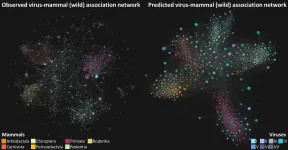Curtin research finds 'fool's gold' not so foolish after all
Curtin University research has found tiny amounts of gold can be trapped inside pyrite, commonly known as 'fool's gold,' which would make it much more valuable than its name suggests
2021-06-25
(Press-News.org) Curtin University research has found tiny amounts of gold can be trapped inside pyrite, commonly known as 'fool's gold', which would make it much more valuable than its name suggests.
This study, published in the journal Geology in collaboration with the University of Western Australia and the China University of Geoscience, provides an in-depth analysis to better understand the mineralogical location of the trapped gold in pyrite, which may lead to more environmentally friendly gold extraction methods.
Lead researcher Dr Denis Fougerouse from Curtin's School of Earth and Planetary Sciences said this new type of "invisible" gold has not previously been recognised and is only observable using a scientific instrument called an atom probe.
"The discovery rate of new gold deposits is in decline worldwide with the quality of ore degrading, parallel to the value of precious metal increasing," Dr Fougerouse said.
"Previously gold extractors have been able to find gold in pyrite either as nanoparticles or as a pyrite-gold alloy, but what we have discovered is that gold can also be hosted in nanoscale crystal defects, representing a new kind of "invisible" gold.
"The more deformed the crystal is, the more gold there is locked up in defects. The gold is hosted in nanoscale defects called dislocations - one hundred thousand times smaller than the width of a human hair - so a special technique called atom probe tomography is needed to observe it."
Dr Fougerouse said the team also explored gold extraction methods and possible ways to obtain the trapped gold with less adverse impacts on the environment.
"Generally, gold is extracted using pressure oxidizing techniques (similar to cooking), but this process is energy hungry. We wanted to look into an eco-friendlier way of extraction," Dr Fougerouse said.
"We looked into an extraction process called selective leaching, using a fluid to selectively dissolve the gold from the pyrite. Not only do the dislocations trap the gold, but they also behave as fluid pathways that enable the gold to be "leached" without affecting the entire pyrite."
INFORMATION:
The study is supported by the Australian Research Council and the Science and Industry Endowment Fund. Dr Fougerouse is affiliated with The Institute for Geoscience Research (TIGeR), Curtin's flagship Earth Sciences research institute.
The full paper 'A new kind of invisible gold in pyrite hosted in deformation-related dislocations' is available online here: https://pubs.geoscienceworld.org/gsa/geology/article/doi/10.1130/G49028.1/604581/A-new-kind-of-invisible-gold-in-pyrite-hosted-in
ELSE PRESS RELEASES FROM THIS DATE:
2021-06-25
Effective diagnostics, therapies and treatments for diseases and infections could increasingly involve re-engineering the body's internal biomechanisms at their most basic chemical and molecular foundations.
Growing knowledge about the body's biological processes is increasing the possibilities for restoring human health, says Xiao Wang, an associate professor of biomedical engineering in Arizona State University's Ira A. Fulton Schools of Engineering. He and a team of researchers are exploring ways to trigger and control cell differentiation and transition to unlock properties that may change bioengineers' approach to diagnostics, ...
2021-06-25
PITTSBURGH, June 25, 2021 - It is widely assumed that Americans' sexual activity took a nosedive during the early chaotic months of the coronavirus pandemic. But a new study from the University of Pittsburgh School of Medicine challenges this popular narrative.
In a research letter published in the Journal of Internal Medicine, scientists from Pitt and UPMC found that some people were having more sex during the pandemic than ever before. That group? Older men with erectile dysfunction.
"People's sexual lives contribute to the psychosocial fabric of society," said senior author Benjamin Davies, M.D., director of the Urologic Oncology Program at ...
2021-06-25
Researchers at the National Institute of Standards and Technology (NIST) and Wavsens LLC have developed a method for using radio signals to create real-time images and videos of hidden and moving objects, which could help firefighters find escape routes or victims inside buildings filled with fire and smoke. The technique could also help track hypersonic objects such as missiles and space debris.
The new method, described in Nature Communications, could provide critical information to help reduce deaths and injuries. Locating and tracking first responders indoors is a prime goal for the public safety ...
2021-06-25
A new University of Liverpool study could help scientists mitigate the future spread of zoonotic and livestock diseases caused by existing viruses.
Researchers have used a form or artificial intelligence (AI) called machine-learning to predict more than 20,000 unknown associations between known viruses and susceptible mammalian species. The findings, which are published in Nature Communications, could be used to help target disease surveillance programmes.
Thousands of viruses are known to affect mammals, with recent estimates indicating that less than 1% of mammalian viral diversity has been discovered to date. ...
2021-06-25
Canadian researchers at The Ottawa Hospital, the University of Ottawa, the Bruyère Research Institute and ICES have built and validated an online calculator that empowers individuals 55 and over to better understand the health of their brain and how they can reduce their risk of being diagnosed with dementia in the next five years.
Their process was published today in the Journal of Epidemiology and Community Health, and the calculator is available at projectbiglife.ca.
Dementia is an umbrella term for loss of memory and other thinking abilities severe enough to interfere with daily life. Every year, 76,000 new cases of dementia are diagnosed ...
2021-06-25
Multisystem Inflammatory Syndrome in Children (MIS-C) significantly affected more Black and Latino children than white children, with Black children at the highest risk, according to a new observational study of 124 pediatric patients treated at Children's National Hospital in Washington, D.C. Researchers also found cardiac complications, including systolic myocardial dysfunction and valvular regurgitation, were more common in MIS-C patients who were critically ill. Of the 124 patients, 63 were ultimately diagnosed with MIS-C and were compared with 61 patients deemed controls who presented with similar symptoms but ultimately had an alternative diagnosis.
In the study, published ...
2021-06-25
Burnout is a widespread reality in today's NHS
Current NHS workforce plans are "a smart looking car minus the engine"
An editorial published by The BMJ today raises important concerns about the health
and wellbeing of the NHS workforce after a parliamentary report found "burnout is a widespread reality in today's NHS."
Commenting on the report, Suzie Bailey of the King's Fund says: "Excessive workloads need to be dealt with at every level of the health and care system."
She suggests that ineffective workforce planning is partly to blame, citing evidence ...
2021-06-25
New research has discovered that common artificial sweeteners can cause previously healthy gut bacteria to become diseased and invade the gut wall, potentially leading to serious health issues.
The study, published in the International Journal of Molecular Sciences, is the first to show the pathogenic effects of some of the most widely used artificial sweeteners - saccharin, sucralose, and aspartame - on two types of gut bacteria, E. coli (Escherichia coli) and E. faecalis (Enterococcus faecalis).
Previous studies have shown that artificial sweeteners can change the number and type of bacteria in the gut, but this new molecular research, led by academics from Anglia Ruskin University (ARU), has demonstrated that sweeteners can also make ...
2021-06-25
A growing trove of data to help scientists understand the biology of Alzheimer's disease among diverse populations within the context of sociocultural, behavioral and environmental factors is now available through the Institute for Translational Research at The University of North Texas Health Science Center at Fort Worth (HSC).
The research data is the result of the Health and Aging Brain among Latino Elders (HABLE) study launched in 2017 with $12 million in funding from the National Institutes of Health and headed by Sid O'Bryant, PhD, Executive Director of the Institute.
In 2020, the HABLE study received an additional $45 million from ...
2021-06-25
Over the last decade, severe outbreaks of bacterial canker have caused huge economic losses for kiwi growers, especially in Italy, New Zealand, and China, which are among the largest producers. Bacterial canker is caused by the bacterial pathogen Pseudomonas syringae pv. actinidiae (Psa) and more recent outbreaks have been particularly devastating due to the emergence of a new, extremely aggressive biovar called Psa3.
Due to its recent introduction, the molecular basis of Psa3's virulence is unknown, making it difficult to develop mitigation strategies. In light of this dilemma, a group of scientists at the University of Verona and University of Rome collaborated on ...
LAST 30 PRESS RELEASES:
[Press-News.org] Curtin research finds 'fool's gold' not so foolish after all
Curtin University research has found tiny amounts of gold can be trapped inside pyrite, commonly known as 'fool's gold,' which would make it much more valuable than its name suggests





